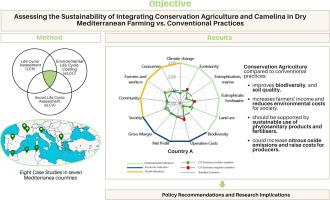通过生命周期思维评估可持续性权衡:在地中海碳农业系统中引入保护性农业
IF 10.9
1区 环境科学与生态学
Q1 ENGINEERING, ENVIRONMENTAL
引用次数: 0
摘要
农业对环境的影响是可持续粮食系统讨论的核心,因为目前的做法往往会损害土壤、水、生物多样性和生态系统健康。碳农业已经成为一种很有前途的战略,可以改善土壤健康,增加有机碳,并支持盈利。然而,生命周期评估在捕捉农业的多功能作用方面存在局限性,促使社会经济分析的整合。本研究使用生命周期思维(LCT)方法评估保护性农业的环境、经济和社会方面,特别是对亚麻荠(camelina Sativa (L.))进行了测试。作为地中海旱地系统的一种经济覆盖作物。在8个案例研究中,研究结果表明,保护措施和引进亚麻荠可以提高生物多样性、土壤健康和农民收入,同时降低环境成本并为油籽创造可持续的市场机会。尽管存在潜在的权衡,例如投入成本增加和一氧化二氮排放增加,但仍提供了政策建议,以支持可持续实践,并利用LCT框架指导地中海农业的复原力。本文章由计算机程序翻译,如有差异,请以英文原文为准。

Assessing sustainability trade-offs through life cycle thinking: introducing conservation agriculture in Mediterranean carbon farming systems
The environmental impacts of farming are central in sustainable food system discussions, as current practices often harm soils, water, biodiversity, and ecosystem health. Carbon farming has emerged as a promising strategy, improving soil health, increasing organic carbon, and supporting profitability. However, Life Cycle Assessment has limitations in capturing agriculture's multifunctional roles, prompting the integration of socio-economic analyses. This study uses Life Cycle Thinking (LCT) methods to assess the environmental, economic, and social aspects of Conservation Agriculture, specifically testing camelina [Camelina Sativa (L.) Crantz] as a cash-cover crop in Mediterranean dryland systems. Across eight case studies, findings suggest that conservation practices and camelina introduction can enhance biodiversity, soil health, and farmer incomes, while reducing environmental costs and creating sustainable market opportunities for oilseeds. Despite potential trade-offs, such as increased input costs and nitrous oxide emissions, policy recommendations are provided to support sustainable practices, with LCT frameworks guiding resilience in Mediterranean agriculture.
求助全文
通过发布文献求助,成功后即可免费获取论文全文。
去求助
来源期刊

Resources Conservation and Recycling
环境科学-工程:环境
CiteScore
22.90
自引率
6.10%
发文量
625
审稿时长
23 days
期刊介绍:
The journal Resources, Conservation & Recycling welcomes contributions from research, which consider sustainable management and conservation of resources. The journal prioritizes understanding the transformation processes crucial for transitioning toward more sustainable production and consumption systems. It highlights technological, economic, institutional, and policy aspects related to specific resource management practices such as conservation, recycling, and resource substitution, as well as broader strategies like improving resource productivity and restructuring production and consumption patterns.
Contributions may address regional, national, or international scales and can range from individual resources or technologies to entire sectors or systems. Authors are encouraged to explore scientific and methodological issues alongside practical, environmental, and economic implications. However, manuscripts focusing solely on laboratory experiments without discussing their broader implications will not be considered for publication in the journal.
 求助内容:
求助内容: 应助结果提醒方式:
应助结果提醒方式:


